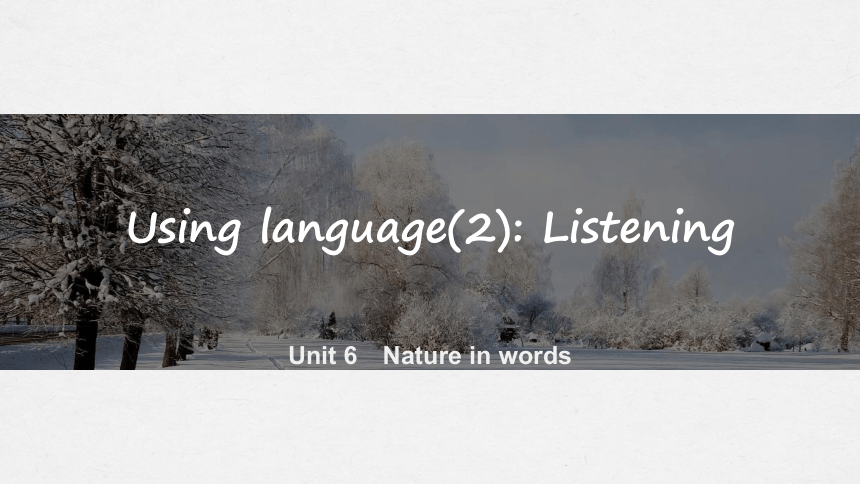(
课件网) Unit 6 Nature in words Using language(2): Listening By the end of this period, students will be able to: 1. understand and talk about literature related to nature; 2.use of words and expressions to describe nature through different forms of literature. Open a dictionary, and you’ll be surprised to find that there are many more words about nature than you would think. There are various ways to describe the things we see in the natural world, no matter whether it’s a flower, a weed, an animal or the rain. For example, there are many ways to describe the different sounds of birds, such as chatter, chirp, cluck, hoot and tweet. These words can help us to write vivid descriptions of nature. Listen to the conversation and answer the questions. 1. What book was the man reading The man was reading a book called Landmarks. 2. Why was the man annoyed Many words describing nature were now missing from the new version of the junior dictionary. 3. What was the girl’s opinion Maybe the dictionary has a point. Most children don’t get out into nature that much nowadays. They spend much of their time on computers, for instance. She thinks the new terms they added are words we hear in our everyday use. Recently I was reading a book called Landmarks by Robert Macfarlane. What the author wrote made me feel confused. He said that many words describing nature were being added to the new version of the junior dictionary. These are words like “pasture” and “bluebell”. A “pasture” is a dense forest for cows and horses to eat. “Bluebells” are fruit shaped like bells. The reason why they are doing this is that they think these words are irrelevant to children, so instead they’ve replaced them with terms like “film”. annoyed now missing from field of grass blue flowers blog Listen to the conversation again and correct the mistakes in the man’s blog. Perhaps the dictionary does have a point, because most children don’t get out into nature that much nowadays. They spend all their time watching TV instead. But it’s a pity. In my opinion, these words form part of our literature. They add colour to our lives, and shouldn’t be lost. My granddaughter has the same opinion as me. She says we are losing old words all the time. And as times change, old words become as normal to young people as the new ones are to me. on computers history a different opinion from new words become as normal to young people as the old ones are to me Listening materials M = male speaker, Eric, grandfather; F = female speaker, Suzie, his granddaughter F: Morning, Grandpa! M: [grumpily] Morning, Suzie. F: Grandpa, is there something wrong You seem a bit upset. M: Yes, well... I’m sorry, Suzie. It’s just that I’ve been reading this new book called Landmarks by Robert Macfarlane, and something he wrote about has made me rather annoyed. F: What is it M: He explained that many words describing nature were now missing from th ... ...

